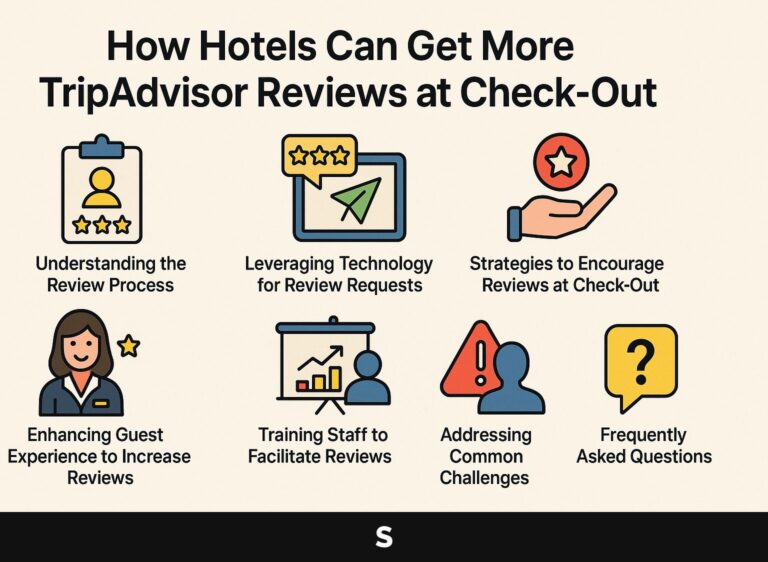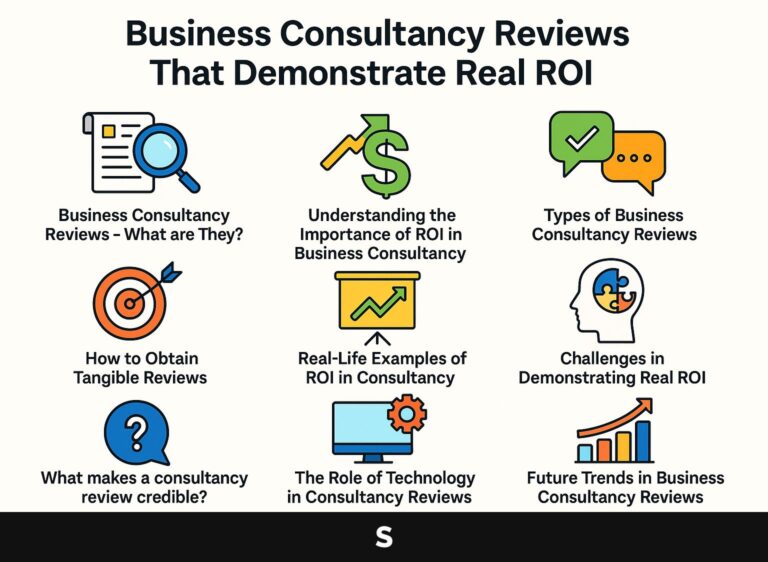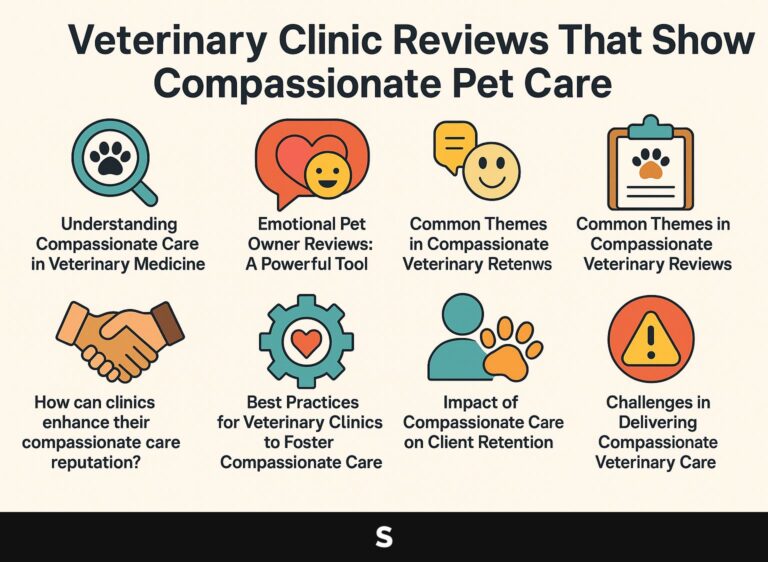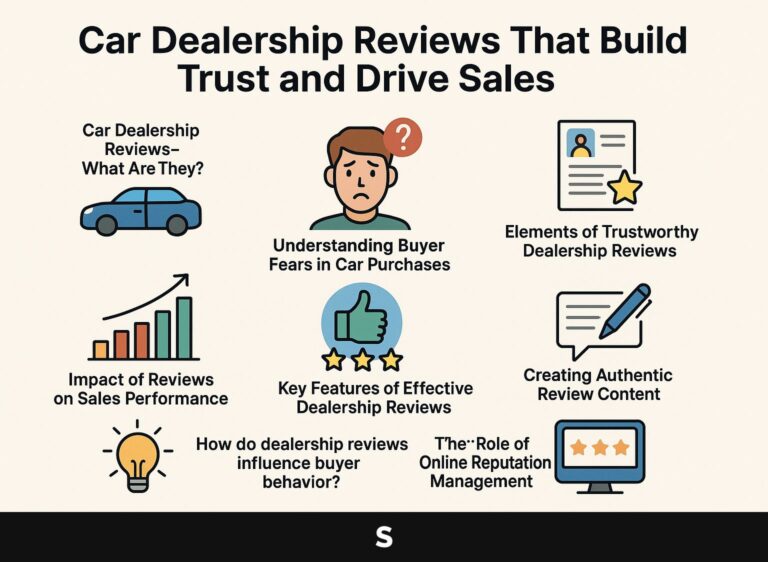Mental Health Practice Reviews That Encourage Others to Seek Help
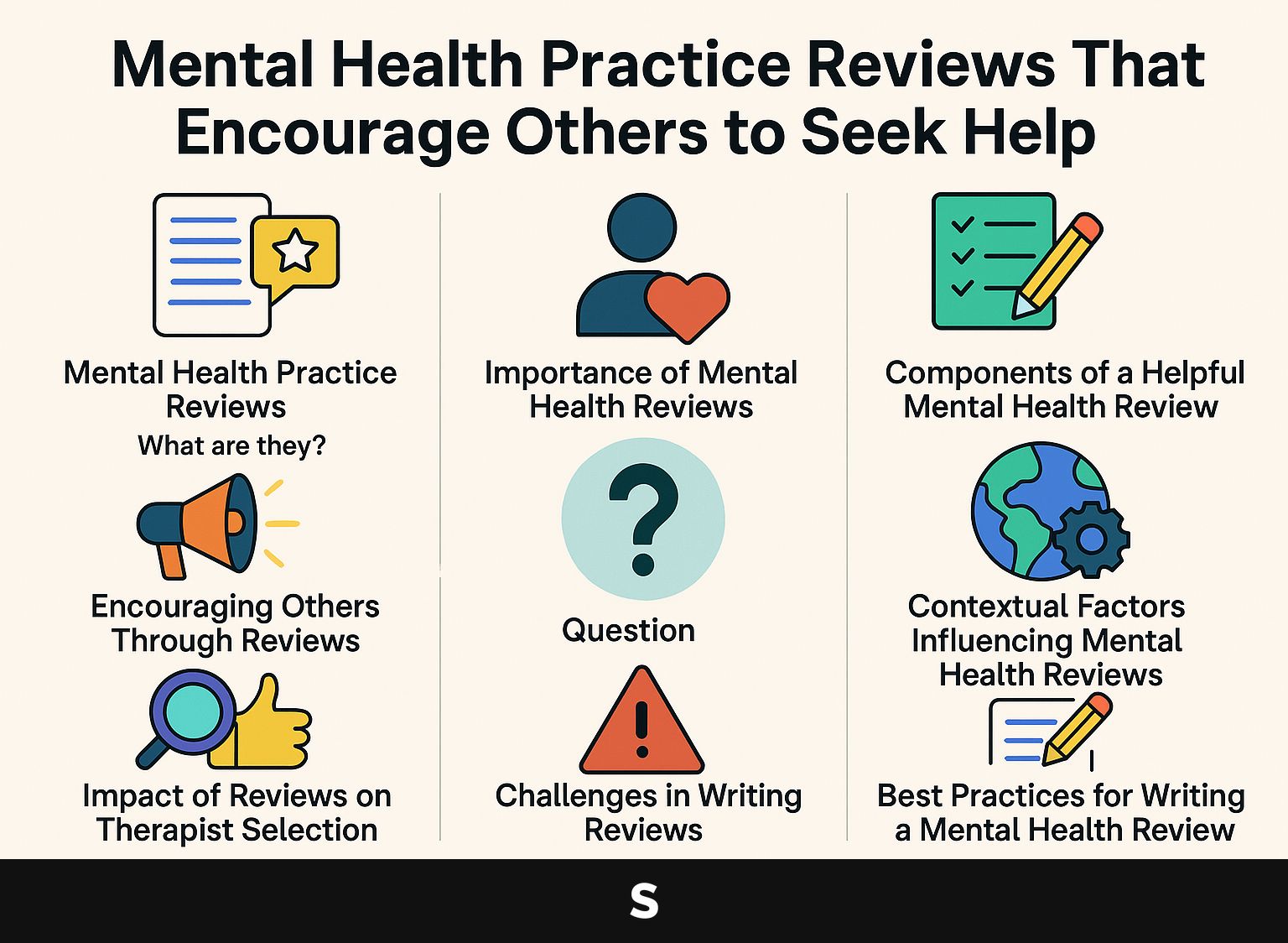
Finding the right mental health help can be hard, but strong client feedback can greatly help. At Spokk.io, we think sharing personal stories, such as Sabrina Martinez’s experience with Dr. Garcia, can motivate others to ask for assistance. This article will examine mental health practice evaluations. It will discuss the importance of ethical standards, the role of marketing companies like Beacon Media + Marketing, and how real testimonials can help people focus on their well-being. Help us challenge the stigma and spread hope by sharing real stories.
Key Takeaways:
- Mental health reviews differ from traditional reviews and have the power to reduce stigma and build trust with therapists.
- Personal stories and feelings expressed in reviews can motivate and persuade others to get support.
- Structured and balanced reviews can maximize their impact and help individuals make informed decisions when selecting a therapist.
- Mental Health Practice Reviews – What are they?
- Importance of Mental Health Reviews
- Components of a Helpful Mental Health Review
- Encouraging Others Through Reviews
- How can mental health reviews be structured to maximize encouragement?
- Factors That Affect Mental Health Reviews
- Impact of Reviews on Therapist Selection
- Challenges in Writing Reviews
- Best Practices for Writing a Mental Health Review
- Role of Online Platforms in Mental Health Reviews
- Reviews on Upcoming Mental Health Practices
- Frequently Asked Questions
- 1. What is the purpose of mental health practice reviews?
- 2. How can reading mental health practice reviews help others?
- 3. What should I look for in a mental health practice review that motivates people to get support?
- 4. Why is it important to share my experience in a mental health practice review?
- 5. Are mental health practice reviews confidential?
- 6. How can I write a useful review of a mental health practice that motivates others to get help?
Mental Health Practice Reviews – What are they?
Mental health practice reviews are special assessments that share client feedback about their sessions with therapists, highlighting the relationship between clients and therapists and the quality of care provided.
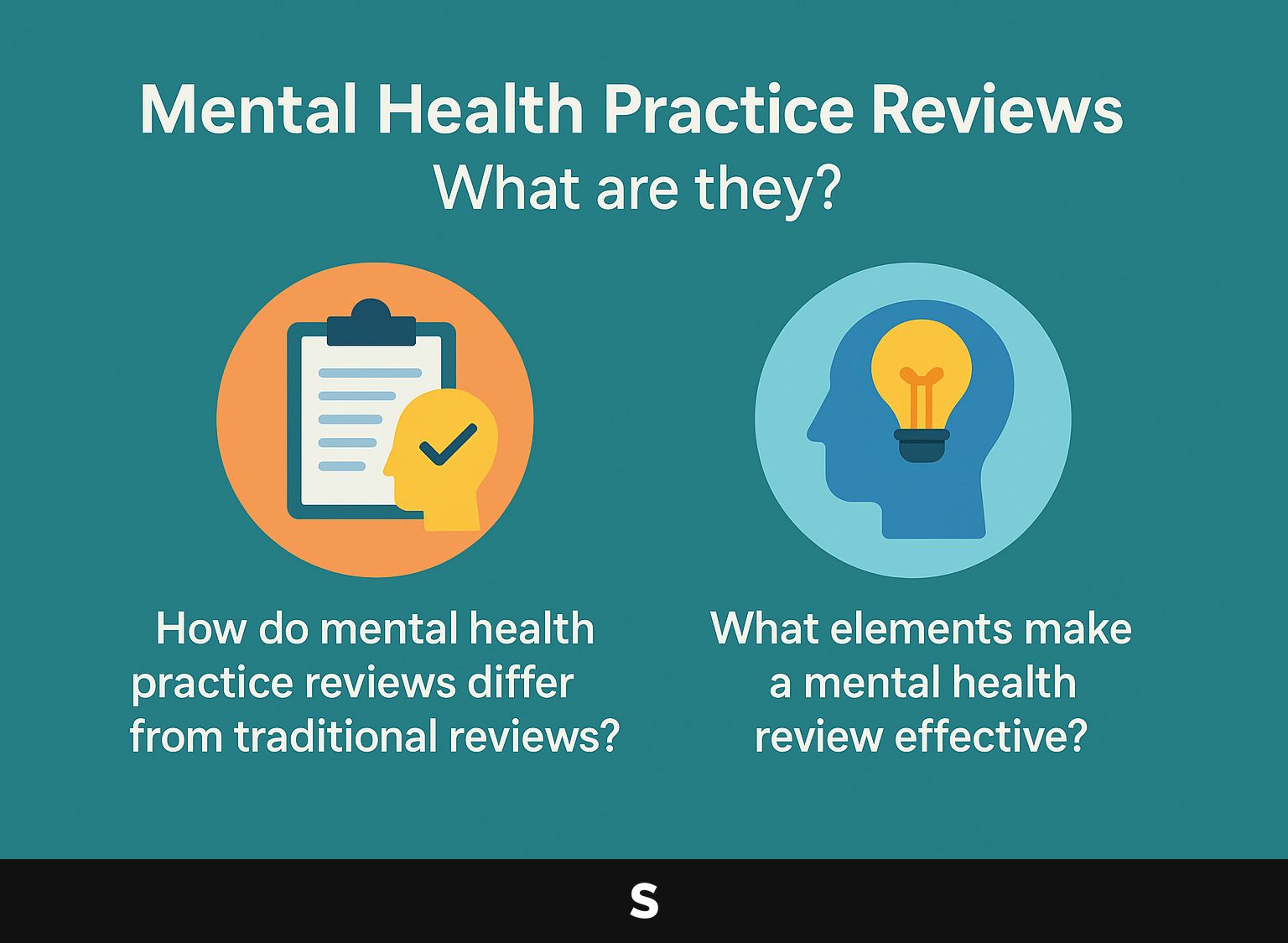
1. How do mental health practice reviews differ from traditional reviews?
Unlike traditional reviews, mental health practice reviews focus on emotional and psychological outcomes, emphasizing the subjective experiences of clients in therapy.
These reviews often point out particular therapy methods that connect well with clients, like cognitive-behavioral therapy (CBT) or mindfulness exercises.
For instance, a client might share how CBT helped them reframe negative thoughts, leading to decreased anxiety. It’s important to keep information private, so reviewers need to make sure client stories stay anonymous.
Including metrics like client satisfaction scores or session outcomes can make the review more believable and give useful information for people looking for effective therapy options.
2. What elements make a mental health review effective?
A useful mental health review should include genuine emotions, clear results, and practical information that connects with people looking for therapy.
To do this, focus on experiences that people can connect with and significant changes. For instance, instead of generic phrases, describe how a client felt during a breakthrough session.
Use specifics: ‘After three months of cognitive-behavioral therapy, Jane reported a 50% decrease in anxiety symptoms, allowing her to regain her confidence in social situations.’
Include practical advice, like suggesting mindfulness techniques, to give potential clients concrete tips they can use. Write reviews that give useful information and encourage others by showing that people have had positive experiences when looking for help.
Importance of Mental Health Reviews
Mental health reviews are important in forming views about therapy, which can affect people’s choices to get help and support.
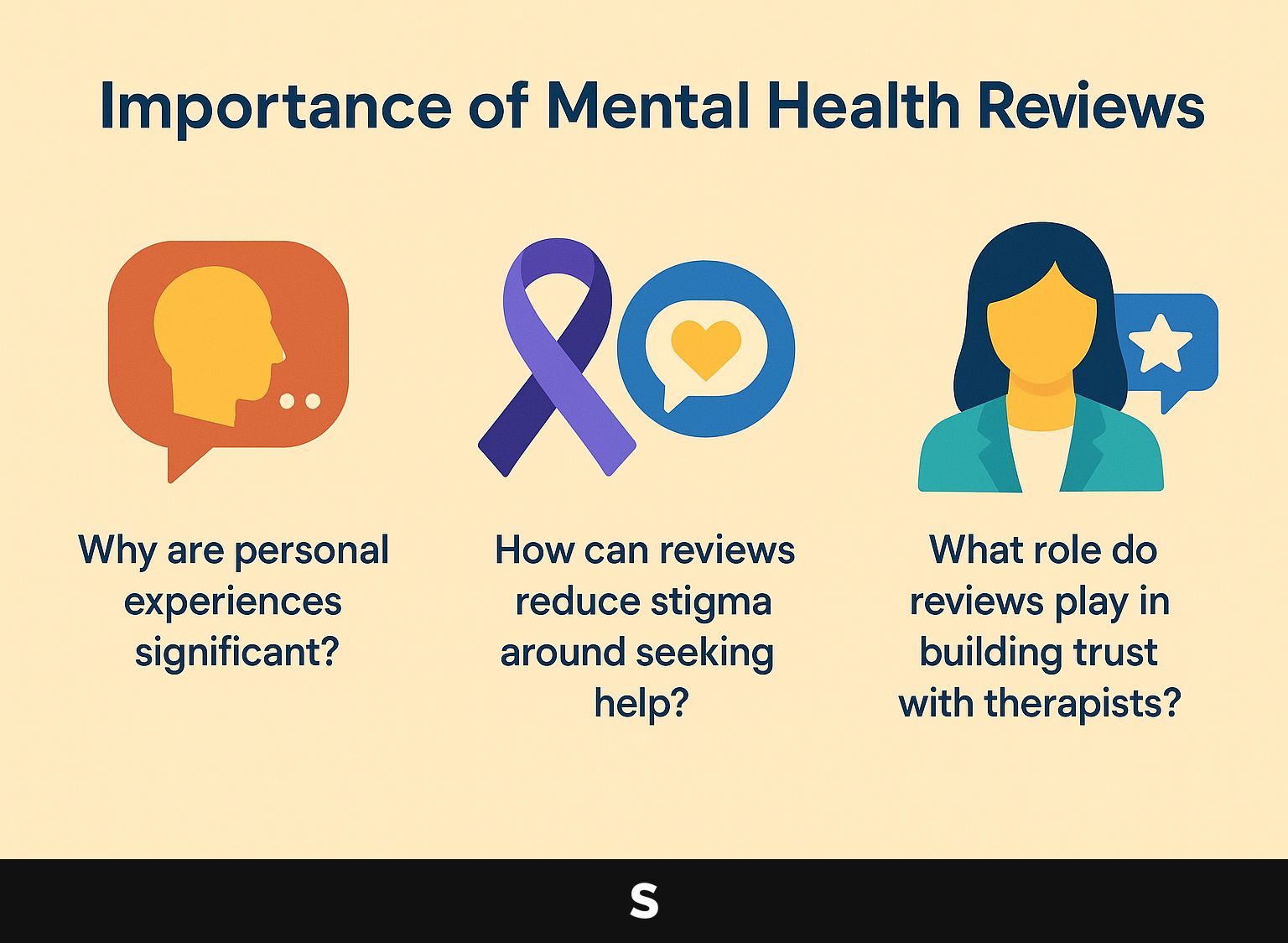
1. Why are personal experiences significant in mental health?
Sharing personal stories in mental health reviews can make it easier for others to feel understood and motivate them to get support.
Sharing these stories creates a sense of community, where individuals can relate to common issues such as anxiety and depression.
For instance, initiating group discussions or online forums allows people to express their feelings in a safe environment. Using platforms like Meetup or Facebook Groups can help facilitate these connections, while hosting virtual support sessions can reach those who may feel isolated.
Sharing experiences through blogs or podcasts can inspire and support others by offering strength through these shared stories.
2. How can reviews lessen the stigma of asking for help?
Talking about personal mental health experiences in reviews can reduce stereotypes and motivate people to get help.
For instance, sharing stories about overcoming anxiety can humanize these struggles. According to Dr. Sarah Johnson, a clinical psychologist, “When people hear others share their problems, it makes them feel understood and motivates them to find help.”
Websites like Reddit or specific mental health blogs let people share their experiences without revealing their identity, building supportive communities. These resources can encourage open conversations, making it easier to discuss mental health without shame and urging people to get help.
3. What role do reviews play in building trust with therapists?
Trust is important in therapy, and reviews give people information about therapists’ methods, helping them feel safe and able to depend on the therapist.
Regular positive comments about a therapist’s method can greatly improve their reputation. For example, testimonials that focus on qualities like empathy, professionalism, and clear communication can connect well with potential clients.
Therapists can use platforms such as Psychology Today or Healthgrades to gather and show these reviews, which are easy to locate. Therapists can encourage satisfied clients to leave feedback, perhaps by providing a simple link after sessions.
Collecting positive comments often builds trust, making it easier for new clients to choose the right therapist.
Components of a Helpful Mental Health Review
A useful mental health review should combine personal stories with helpful feedback to offer a complete view of the therapy experience.
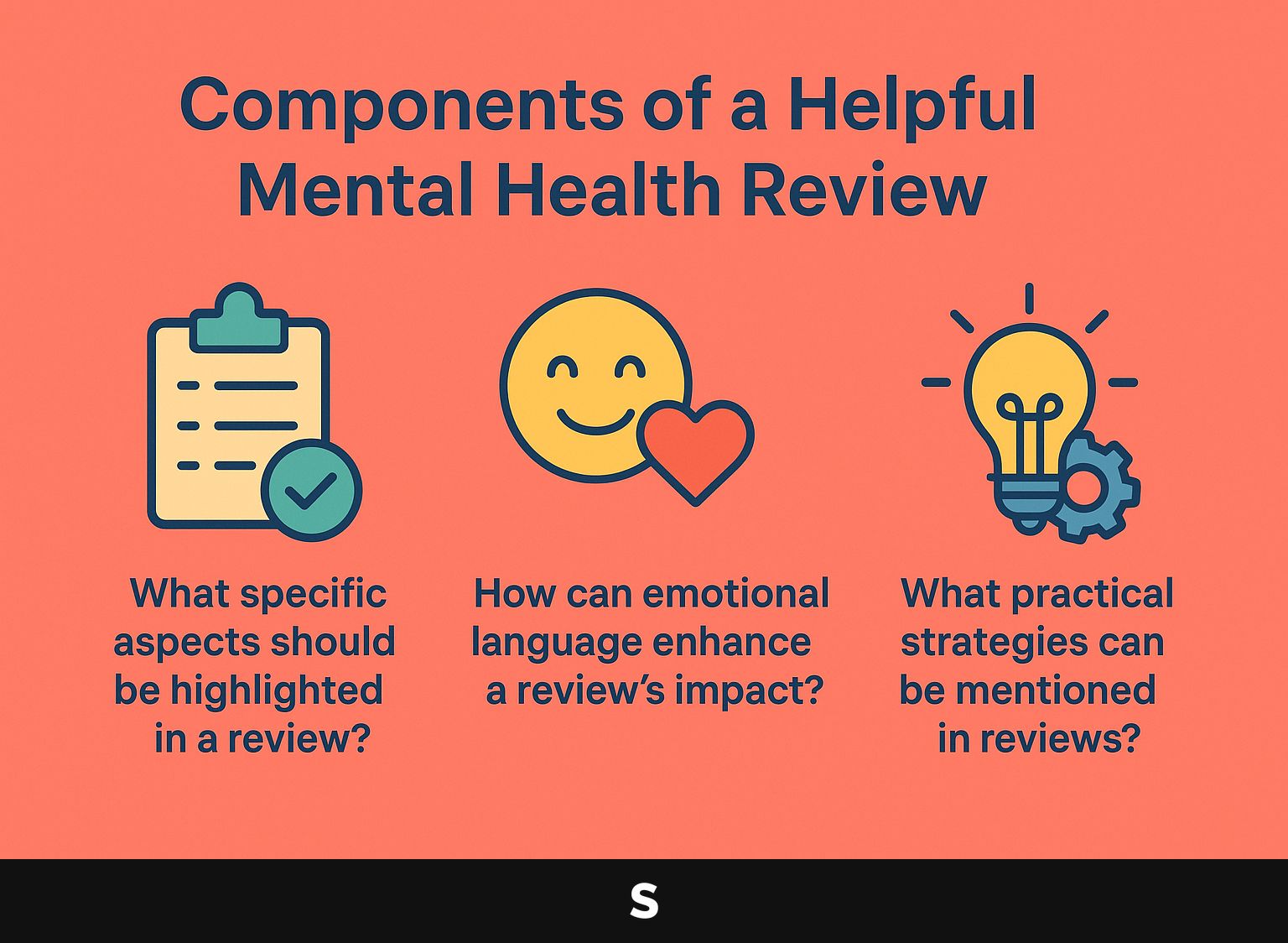
1. What specific aspects should be highlighted in a review?
Key aspects to highlight in a mental health review include the therapist’s communication style, the effectiveness of interventions, and the overall environment of the practice.
In your review, emphasize the therapist’s ability to listen and respond empathetically, illustrating this with personal examples if possible.
Discuss the types of interventions used-cognitive-behavioral therapy, mindfulness techniques, or family therapy-and how effective they were in addressing your specific issues. Comment on the office atmosphere; a calm and welcoming space can significantly impact the therapeutic experience.
It’s helpful to check when the therapist is available for sessions and if they offer online appointments, as being flexible is often important for ongoing participation.
2. How can emotional language make a review more powerful?
Using feelings in reviews helps create a strong connection with readers, making it simpler for them to understand and feel the experiences.
Some phrases, such as ‘important trip’ or ‘major life event,’ can inspire hope and a feeling of opportunity. Words like ‘heartwarming’ or ‘painful’ create a strong bond with the reader and make the story feel relatable.
For example, instead of saying ‘the therapy helped me,’ try ‘this therapy allowed me to recover in surprising ways.’ Resources like the Emotion Thesaurus can aid in finding and enhancing this type of language, making it more interesting for readers and encouraging a deeper connection.
These strong words can shift how someone thinks about therapy, making it seem more approachable and helpful.
3. What practical strategies can be mentioned in reviews?
Including practical tips in reviews, like specific methods or tools used in therapy, can help readers looking for concrete advice.
For instance, mindfulness techniques like deep breathing exercises can be incredibly effective. Practicing a simple 4-7-8 breath-inhale for 4 seconds, hold for 7, then exhale for 8-helps reduce anxiety.
Journaling can serve as a therapeutic outlet; try the ‘3 Gratitudes’ exercise where you write down three things you’re grateful for each day to shift your focus positively. Apps like Headspace provide guided meditations, which can improve mindfulness and help develop resilience over time.
Encouraging Others Through Reviews
Personal stories in reviews can encourage others by showing that asking for help is a courageous and helpful action.
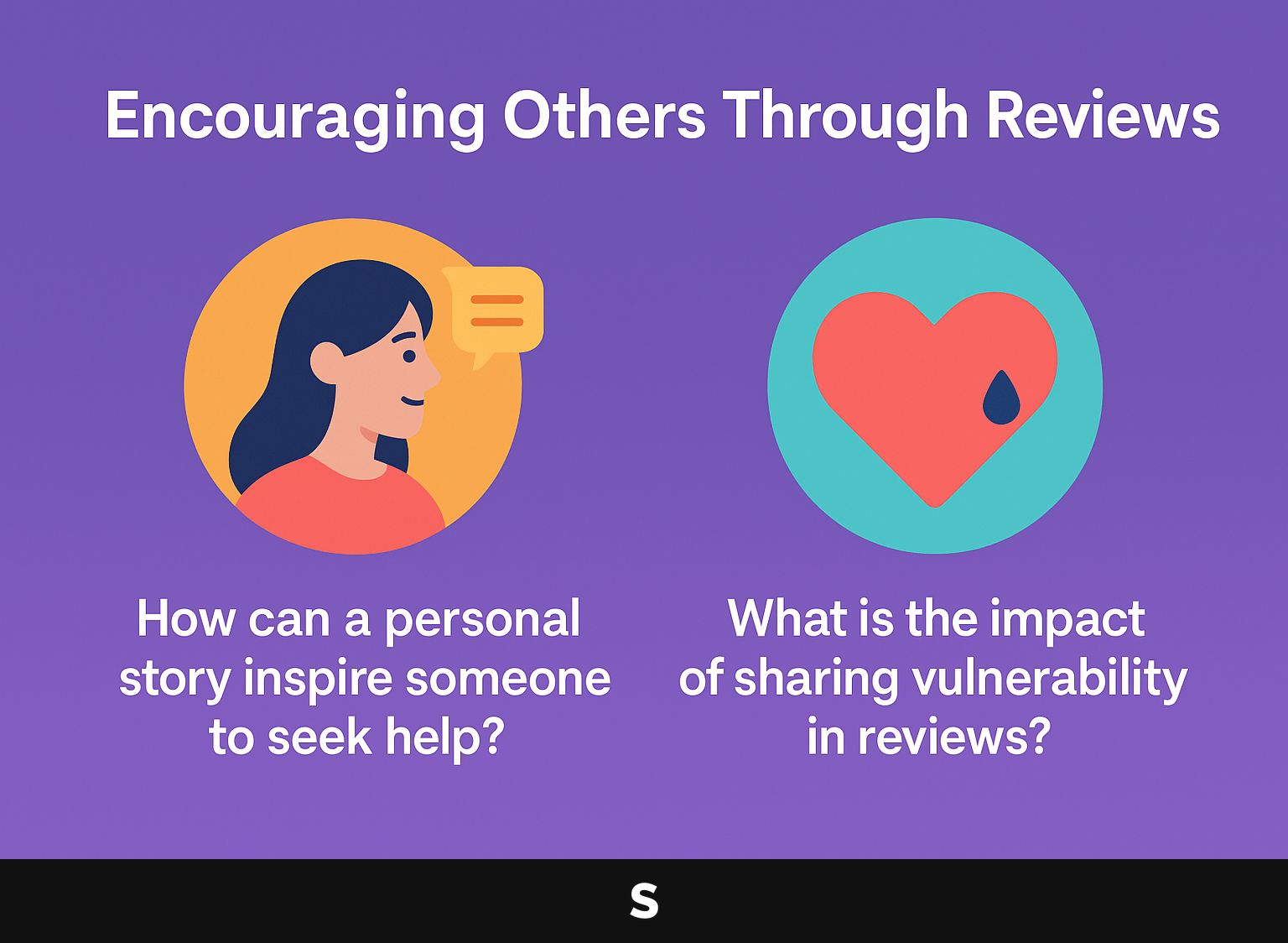
1. How can a personal story motivate someone to get help?
A personal story can strongly connect with someone facing difficulties, giving them hope and encouraging them to think about their own mental health experiences.
Talking about personal experiences can change how people view therapy. For instance, a person recounting their battle with anxiety might highlight how articulating their struggles during sessions led to breakthroughs.
This simple story describes a common scenario and encourages people to seek help. Tools like social media platforms can be used effectively to share such stories, increasing their impact.
Blogs or podcasts that share mental health stories can provide a welcoming place for conversation, building community support and decreasing the stigma around therapy.
2. What is the impact of sharing vulnerability in reviews?
Talking openly about personal problems during reviews can build sympathy and connection, helping others feel less isolated and more willing to ask for help.
When people discuss their problems openly, it often encourages others to talk about their experiences as well, which helps to reduce feelings of being alone.
For example, a therapist might say that talking about past traumas can bring relief and help create a supportive group.
Tools like guided journaling or support groups can improve this openness by providing a safe space for sharing. Studies indicate that being open about your feelings can improve how people control their emotions and build trust with others, which helps with recovery and forming bonds.
How can mental health reviews be structured to maximize encouragement?
To maximize encouragement, mental health reviews can be structured to start with positive aspects, followed by challenges faced and how they were overcome.
Start your review by describing the positive feelings or anticipation you had when you decided to get help-maybe the friendly greeting from the therapist. Then, look into particular problems like anxiety or communication issues that came up during sessions.
Share specific goals, such as learning ways to handle stress or reaching personal achievements, which highlight growth and inspire readers. Using vivid stories makes your experiences more relatable, helping others recognize similarities in their own situations and find encouragement in their challenges.
Factors That Affect Mental Health Reviews
Cultural beliefs and online platforms play a big role in shaping how people write and understand mental health reviews.
1. What cultural considerations should be taken into account?
Cultural factors are important in mental health reviews because they can change how people talk about their experiences and how these are understood, affecting how well the communication works.
For example, a person from a community-focused culture might talk about group support, using words like “we” instead of “I.” On the other hand, someone from a culture that values individualism may stress personal success, focusing on their own experiences.
Cultural stigma surrounding mental health can lead to euphemisms or avoidance of direct language, which alters the tone significantly. Mental health professionals should be aware of cultural differences to give feedback that is respectful and clear.
2. How do online platforms shape the nature of mental health reviews?
Websites like Spokk.io are important for mental health reviews because they offer organized spaces where people can share their experiences and gather opinions.
These platforms improve user interaction with features such as simple browsing and discussion boards. For instance, Spokk.io enables users to leave detailed reviews, supporting emotional expression while ensuring anonymity.
Tools such as sentiment analysis help moderators filter feedback and identify common concerns. By integrating community-building tools like discussion threads, users can support each other and share coping strategies.
This connection helps offer balanced reviews and builds a community, improving the quality and effect of feedback.
3. What ethical guidelines should be followed when writing reviews?
Ethical rules are important in mental health evaluations to protect privacy, show respect, and to make sure personal stories are shared correctly.
Key ethical considerations in mental health reviews include HIPAA compliance and informed consent. For example, always anonymize any identifiable information before publication.
Avoid discussing specific clinical details that could reveal a patient’s identity. Common pitfalls include failing to secure consent from individuals before sharing their stories or using direct quotes without permission, which can lead to ethical breaches.
It’s important to set clear rules for content review to protect both the reviewer and the people involved, encouraging a respectful and responsible conversation about mental health.
Impact of Reviews on Therapist Selection
Reviews greatly impact how people choose therapists by giving important information about the therapist’s skills and how happy clients are.
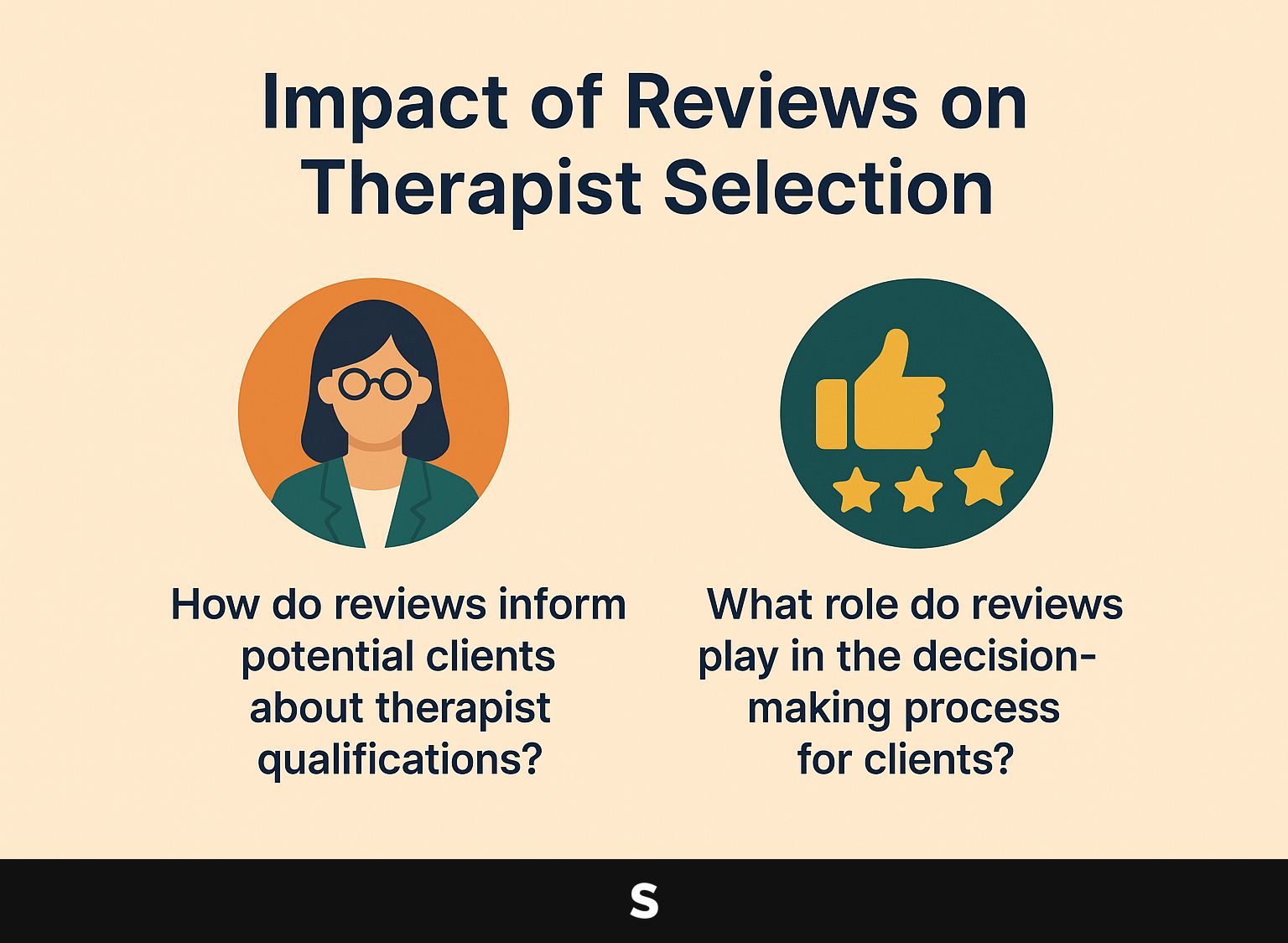
1. How do reviews inform potential clients about therapist qualifications?
Reviews give important information about a therapist’s skills, including their specialties, techniques, and effectiveness in managing therapy.
Reading reviews can help people who need therapy find out about a therapist’s qualifications, such as if they have a master’s degree in psychology or are trained in cognitive-behavioral therapy.
Comments from previous clients often mention specific skills, like empathy or communication style, which can be very important in a therapeutic relationship. Checking regular comments about a therapist’s approach or success can help confirm they meet your personal requirements.
Using platforms like Psychology Today or TherapyDen allows you to filter and compare qualifications and client experiences seamlessly.
2. How do reviews influence clients’ decisions?
When choosing a therapist, clients use reviews to make their decision.
Clients should consider different viewpoints when reading reviews. Positive feedback can illustrate a therapist’s strengths, like effective communication or empathy, while negative comments might highlight potential red flags, such as scheduling issues or unresponsiveness.
Tools like Yelp and Google Reviews let customers sort ratings and read detailed reviews. Looking at reviews on therapist websites or mental health platforms can give more information, helping people make better decisions about their mental health care.
Challenges in Writing Reviews
Writing reviews about mental health can be difficult because people often worry about their privacy and have personal fears that stop them from talking about their experiences.
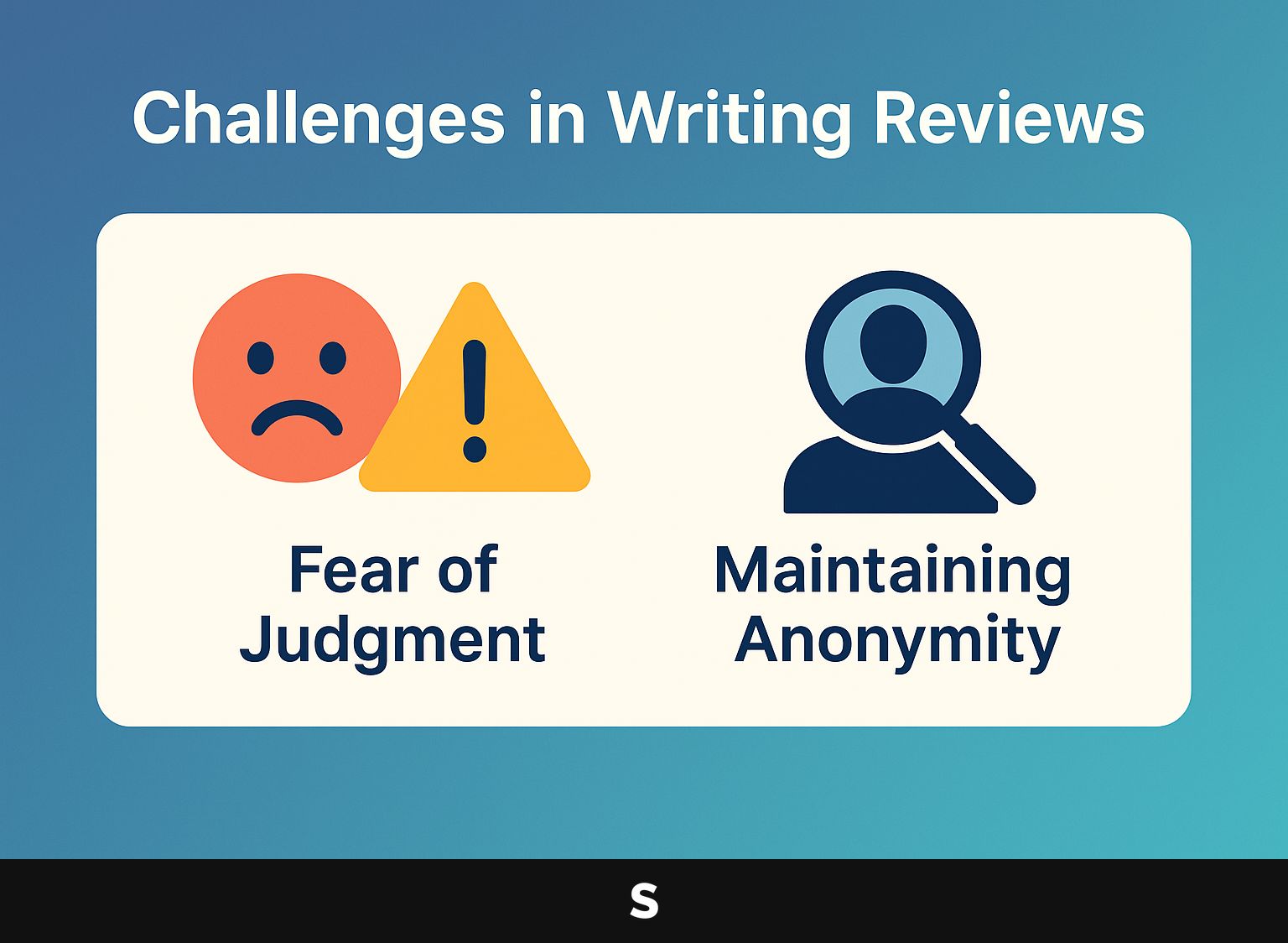
1. What fears might prevent individuals from sharing their experiences?
Fears related to stigma, judgment, and vulnerability often prevent individuals from openly sharing their mental health experiences in reviews.
Creating a supportive community can significantly alleviate these fears. Start by establishing anonymous platforms, like forums or support groups, where individuals can share their stories without revealing their identities.
Encourage regular meetings or online discussions to focus on shared experiences and create a sense of belonging. Think about setting up mentorship programs, matching experienced individuals who have overcome similar obstacles with new participants.
These methods help create a compassionate environment, promoting openness and reducing the stigma surrounding mental health. Teaching participants about mental health can help encourage more open discussions.
2. How can anonymity be maintained in mental health reviews?
Keeping personal information private in mental health reviews is important to safeguard people’s identities and let them talk about their experiences.
To preserve anonymity, use a pseudonym when posting reviews, ensuring that no identifiable information is included.
Focus your feedback on the therapeutic process, detailing the techniques used and their effectiveness rather than personal identifiers. Tools like mental health forums or anonymous survey platforms (e.g., SurveyMonkey) can facilitate sharing while maintaining privacy.
Encourage participants to refrain from sharing details that could reveal their identity, such as specific locations or personal circumstances, to further safeguard their confidentiality.
Best Practices for Writing a Mental Health Review
Following best practices when writing mental health reviews can greatly improve their clarity, interest, and effect on potential clients.
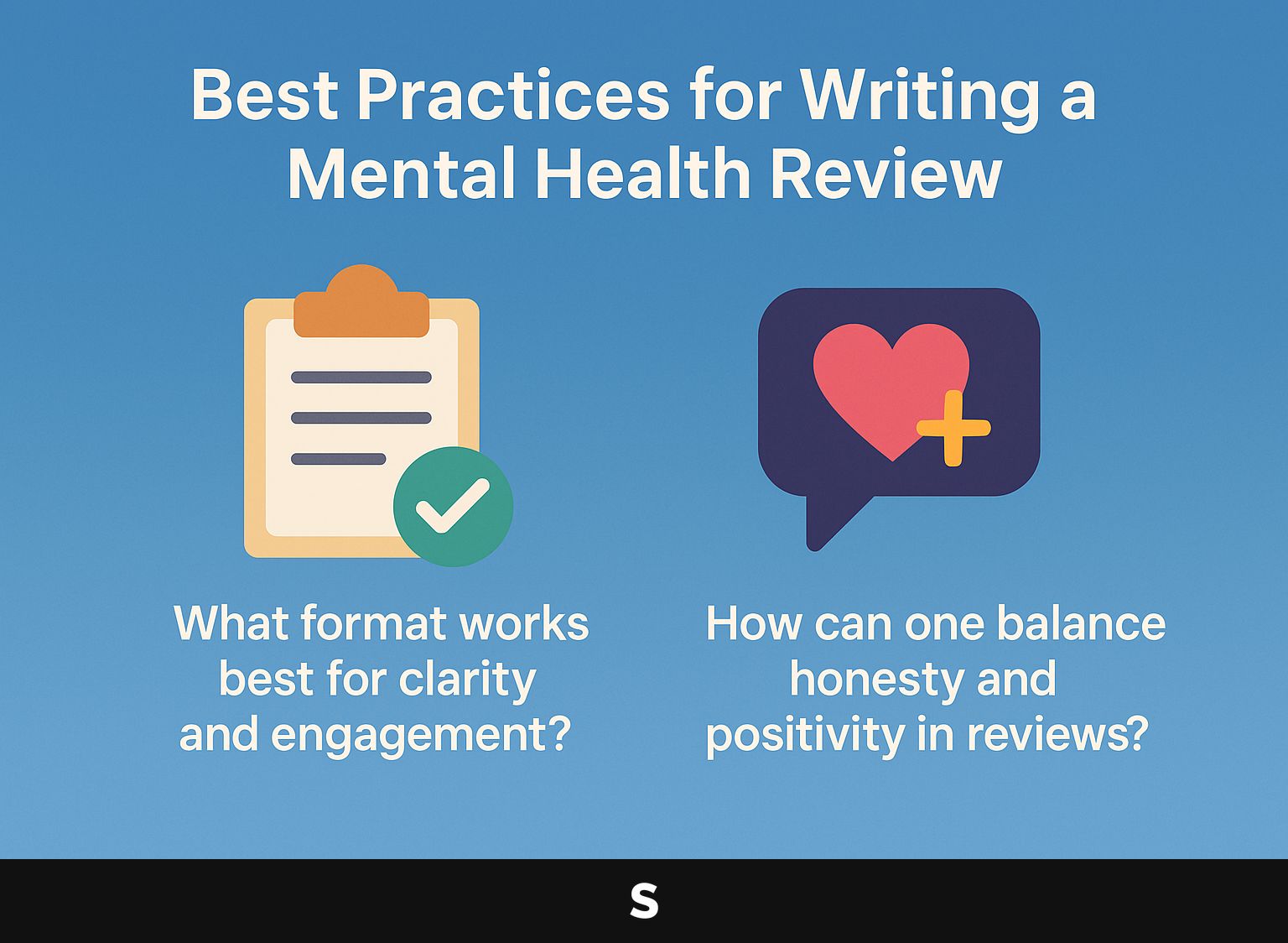
1. What format works best for clarity and engagement?
A clear, engaging format for mental health reviews typically includes a brief introduction, followed by structured sections detailing experiences and outcomes.
Start by introducing the mental health service or provider, highlighting its unique approaches. Follow this with specific sections for patient experiences, such as:
- Therapeutic Techniques: Outline methods used, like cognitive-behavioral therapy or mindfulness practices.
- Results: Share real outcomes, such as improved anxiety ratings or testimonials.
- Accessibility: Discuss ease of scheduling, online options, or affordability.
Conclude with an overall impression, emphasizing whether the service meets diverse needs and encourages ongoing mental wellness. This structure makes the review complete and easy to understand.
2. How can one balance honesty and positivity in reviews?
Being honest and positive in mental health reviews helps show real experiences and motivates people to get support.
To express constructive feedback, start by highlighting positive aspects of your experience, such as supportive staff or a comforting environment. For example, you might say, “I appreciated the therapist’s genuine concern and willingness to listen.”
Next, introduce areas for improvement using ‘I’ statements to express your feelings, like, “I sometimes felt that our sessions lacked direction, which left me a bit confused about my progress.”
This method creates a friendly environment and makes sure your ideas are easy to understand and useful for both the provider and upcoming clients.
Role of Online Platforms in Mental Health Reviews
Websites are important for sharing and displaying reviews about mental health, influencing how these experiences are communicated and perceived.
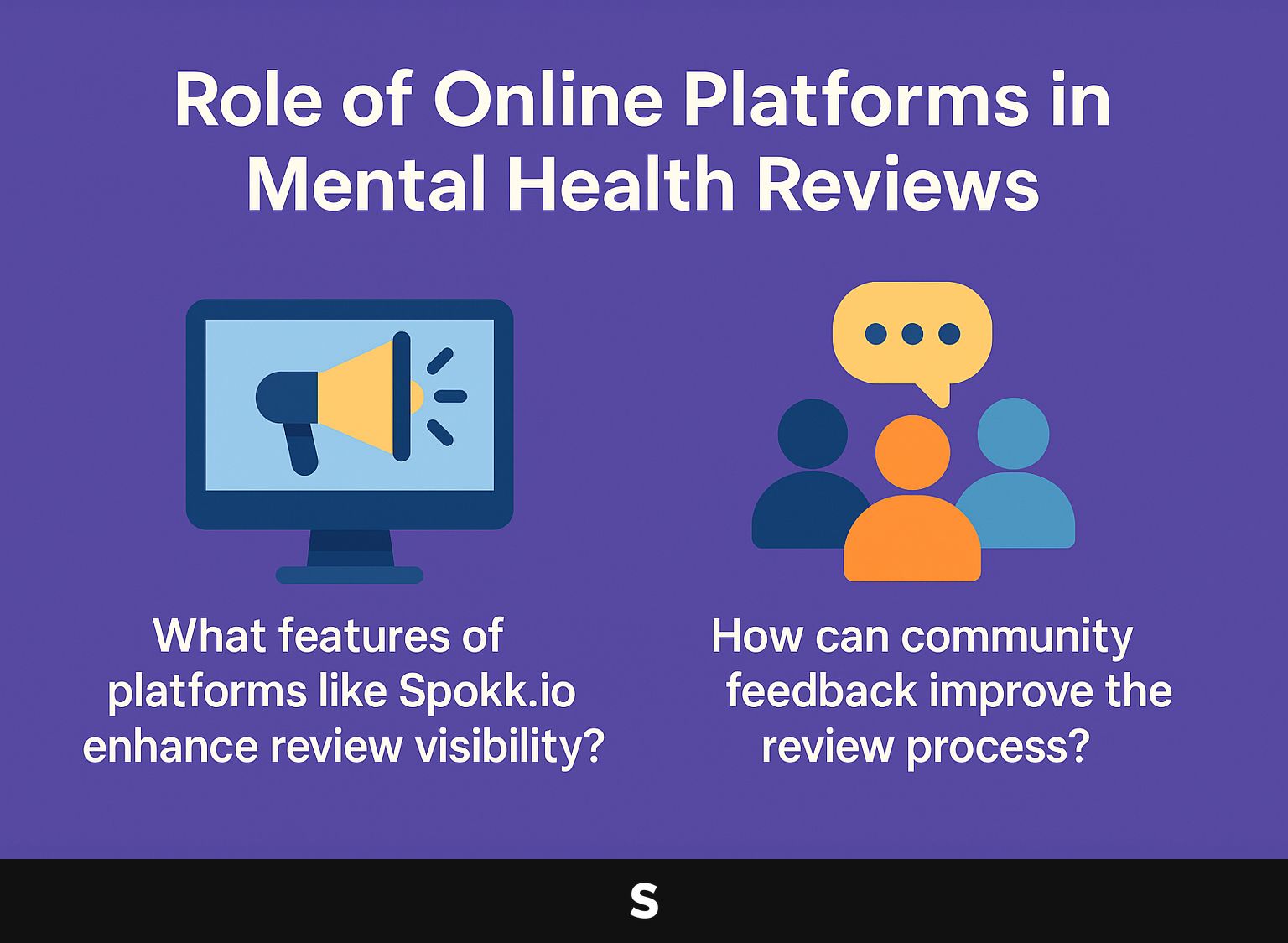
1. What features of platforms like Spokk.io improve how reviews are seen?
Platforms like Spokk.io increase review visibility with easy-to-use interfaces, community interaction tools, and organized feedback systems.
Spokk.io is designed to be user-friendly, allowing people to easily browse the site. Users can organize reviews based on ratings, topics related to mental health, and therapists specialties.
Users can easily take part by sharing their own experiences, which builds a sense of community. The platform has structured prompts to guide users in providing feedback, ensuring that reviews are helpful and complete.
Interactive features like polls or forums allow people to discuss mental health care trends, involving the community and helping to gather useful information.
2. How can community feedback improve the review process?
Community feedback is important for improving the review process. It provides new viewpoints that increase understanding and promote acceptance.
Involving different groups, like clients, professionals, and support organizations, leads to a wide range of experiences. For example, online forums and group therapy sessions provide a space for people to discuss their experiences and difficulties with mental health services.
Tools like SurveyMonkey can be used to collect organized feedback from these community interactions. Creating groups for people to share their thoughts about services helps make reviews more reliable. This team effort improves the quality of reviews, helping users make well-informed decisions.
Reviews on Upcoming Mental Health Practices
New technology and shifts in how society views mental health will influence how mental health practice reviews develop.
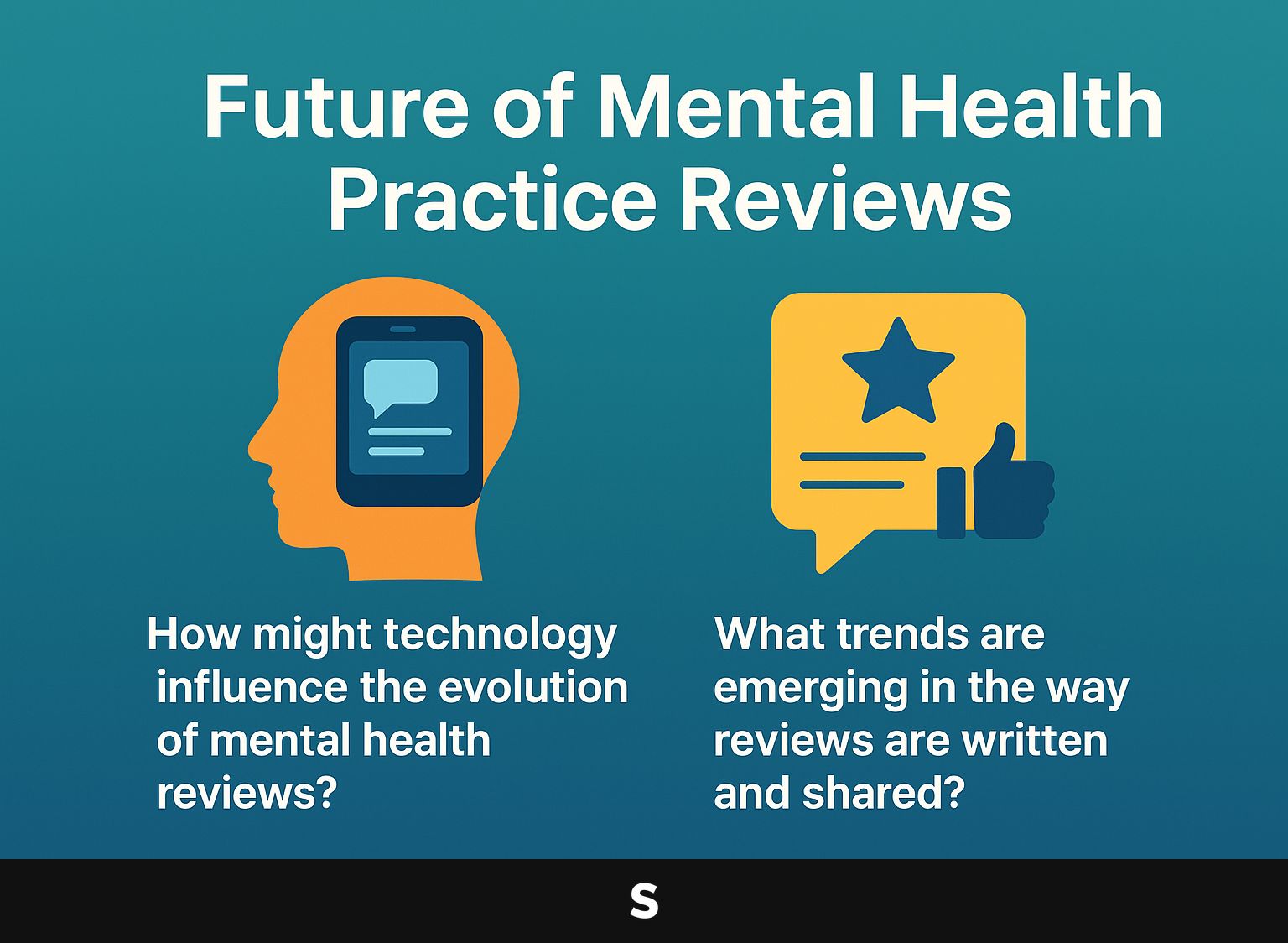
1. How might technology influence the evolution of mental health reviews?
Technology is set to change mental health reviews, allowing more engaging and active sharing of experiences through different online platforms.
A new development involves AI that can summarize reviews by examining user feedback to offer brief information on how well a therapy works. Tools like Grammarly can make user experience clearer, making reviews simpler to read.
Platforms like MindBuddy now enable users to give immediate feedback during meetings, creating a more cooperative atmosphere. By using these technologies, mental health professionals can improve their services and help clients clearly see the options available to them.
Emerging trends in mental health reviews include a shift towards more narrative-driven, authentic storytelling as well as increased use of multimedia elements.
To use these trends successfully, professionals can involve personal stories by asking clients to tell their experiences during meetings. This improves the review and builds a stronger bond with potential clients.
Using visuals such as videos or infographics can increase interest. Tools like Canva for graphics or Zoom for video interviews make this process accessible.
By mixing these parts, mental health reviews become easier to relate to and more meaningful, which helps potential clients feel acknowledged and linked to the services provided.
Frequently Asked Questions
1. What is the purpose of mental health practice reviews?
Mental health practice reviews serve as a platform for individuals to share their experiences and recommendations of therapists and mental health services. These reviews may motivate others to look for assistance and choose appropriate mental health support.
2. How can reading mental health practice reviews help others?
Looking at personal stories and reviews of mental health practices can give useful information about the level of care and how well different therapists work. This can help people decide if they should get mental health support.
3. What should I look for in a mental health practice review that motivates people to get support?
Reviews that motivate others to find support often include positive stories from people who have gained from mental health services. They may also include specific details about the therapist’s approach and the overall atmosphere of the practice.
Sharing your experience in a mental health practice review can help others who may be struggling with similar issues. It can also give helpful feedback to the therapist or mental health practice and help them make their services better.
5. Are mental health practice reviews confidential?
Yes, all reviews are anonymous and confidential. This allows individuals to share their experiences and thoughts without fear of judgment or repercussions.
6. How can I write a useful review of a mental health practice that motivates others to get help?
To write a helpful mental health practice review, be honest and descriptive about your experience. Highlight the positive aspects of the therapist’s approach and how it has impacted your mental health. This can inspire others and motivate them to find support.
